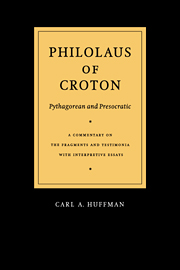 Philolaus of Croton: Pythagorean and Presocratic
Philolaus of Croton: Pythagorean and Presocratic Published online by Cambridge University Press: 06 July 2010
Since the last book devoted exclusively to Philolaus was written by Boeckh in 1819, little apology seems necessary for presenting the scholarly world with a new commentary on his fragments and an interpretation of his philosophy. It is my hope that the present study will provide a basis on which Philolaus and early Pythagoreanism can enter the mainstream of scholarship both on the Presocratics and also on ancient philosophy as a whole. At present, despite the recent work of Schofield (KRS 1983), Barnes (1982), Nussbaum (1978), and Kahn (1974), it would appear that many scholars, at least tacitly, take the advice of Shorey which I print as an epigraph. They seem to feel that it is impossible to talk rigorously about the Pythagoreans in the way that we can about other Presocratics. “Pythagoreanism” seems to mean too much and to be hopelessly vague. The remedy for this problem is to focus detailed attention on the earliest Pythagorean texts we have, the fragments of Philolaus, and to use them as the foundation for our thinking about Pythagoreanism. It will be up to the reader to judge whether I have written any pages to which Shorey's dictum should not apply.
The giant on whose shoulders my work stands is Walter Burkert's magnificent Lore and Science in Ancient Pythagoreanism. Although I disagree with Burkert about the authenticity of a few fragments and although the interpretation of Philolaus' philosophy which I present is radically different from his, the reader will have a hard time finding a page on which I do not owe a debt to his work.
To save this book to your Kindle, first ensure [email protected] is added to your Approved Personal Document E-mail List under your Personal Document Settings on the Manage Your Content and Devices page of your Amazon account. Then enter the ‘name’ part of your Kindle email address below. Find out more about saving to your Kindle.
Note you can select to save to either the @free.kindle.com or @kindle.com variations. ‘@free.kindle.com’ emails are free but can only be saved to your device when it is connected to wi-fi. ‘@kindle.com’ emails can be delivered even when you are not connected to wi-fi, but note that service fees apply.
Find out more about the Kindle Personal Document Service.
To save content items to your account, please confirm that you agree to abide by our usage policies. If this is the first time you use this feature, you will be asked to authorise Cambridge Core to connect with your account. Find out more about saving content to Dropbox.
To save content items to your account, please confirm that you agree to abide by our usage policies. If this is the first time you use this feature, you will be asked to authorise Cambridge Core to connect with your account. Find out more about saving content to Google Drive.